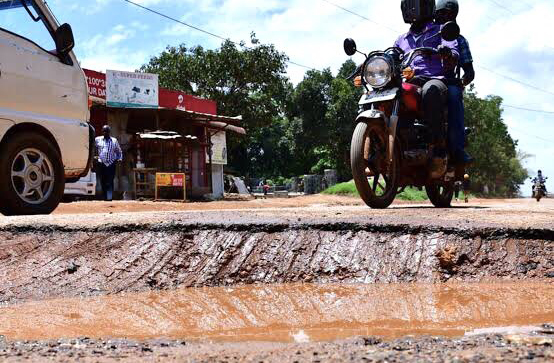C-News Bureau Chief
KAMPALA – The Ministry of Finance, under the leadership of Matia Kasaija, has set aside a significant budget of Shs 4.5 trillion for various infrastructure development projects in Uganda. This allocation, which accounts for 13.3% of the total budget of Shs 52.7 trillion, will be used for road maintenance and construction, railway development and rehabilitation, as well as water and air transport improvements.
Of the allocated funds, Shs 176 billion has been specifically designated for each district, city, and municipality to be utilized for road grading, murram, and compacting, Kasaija said on Budget Day, June 15 at Kololo Independence Grounds. This means that each district, city, and municipality will receive a share of Shs 1 billion.
The announcement of funding for road repairs, especially in the capital city of Kampala, has been met with great enthusiasm by city dwellers. Recently, residents expressed their discontent through a social media campaign called the “Kampala Pothole Exhibition,” which showcased the deplorable condition of roads in the city. This outcry prompted the Kampala Capital City Authority to initiate hasty patch-up efforts to address the issue.
Uganda has made substantial progress in developing its transport infrastructure, which has played a significant role in the country’s recent economic growth. Since 1986, the road network has expanded from 7,900km to an impressive 160,000km, with only 6,700km of paved roads.
According to Minister Kasaija, the government has planned the completion of 16 national road projects in the upcoming fiscal year. These include major routes such as Atiak-Laropi, Moroto-Lokitanyala, Kawuku-Bwerenga, Namugonde-Bugiri, Nsambya-Mukwano, the Kampala Flyover, and Rushere Town and Kyamate Access roads.
Furthermore, priority will be given to maintaining existing road networks at the national and district levels, including urban and community access roads. The government also aims to complete the construction of the Bukungu-Kagwara-Kaberamaido (BKK) Ferry, along with its associated landing sites, as well as the Lake Bunyonyi ferries and their respective landing sites.
In the next financial year, the government plans to commence the construction of the Malaba-Kampala Standard Gauge Railway, with a budget of Shs 535 billion dedicated to this project. Additionally, the redevelopment and expansion of Entebbe International Airport are currently at 85% completion and are expected to be fully operational by July 2024. The construction of Kabalega International Airport is also nearing completion, with 91.7% of the project finished and an expected completion date of September 2023.
Minister Kasaija revealed that the government had secured US$ 608.7 million (equivalent to Shs. 2.25 trillion) to address several challenges faced in the Greater Kampala Metropolitan Area, including flooding, traffic congestion, poor road infrastructure, un-signalized junctions, and unemployment. This funding will be utilized to upgrade 504km of roads, introduce junction signalization in eight urban authorities, rehabilitate 30 stormwater drainage points, upgrade 23 markets, and construct 25 artisanal parks and industrial workspaces for small-scale manufacturers.
In collaboration with the World Bank, the government is also implementing the Uganda Support to Municipal Infrastructure Development program, which has a budget of US$ 360 million. This program aims to improve infrastructure and tackle operational challenges in cities and municipalities across the country.
Apart from infrastructure development, the budget also allocates funds to various sectors and initiatives. These include Shs 9.1 trillion for the legislature, Shs 1.1 trillion for the Parish Development Model, Shs 100 billion for the Emyooga initiative, Shs 60 billion for skilling the youth, Shs 2.2 trillion for food security, irrigation, climate change mitigation, value chain development, agricultural research, and disease control, among others.
Furthermore, Shs 209.3 billion has been earmarked for the Industrial Transformation and Employment (INVITE) initiative, Shs 22.6 billion for clearing arrears for medical interns and senior house officers, Shs 1.3 trillion for electricity interventions, Shs 192 billion for the acceleration of digital transformation, Shs 447 billion for the development of petroleum resources, Shs 257 billion for science, innovation, and technology development, and Shs 54.3 billion for the development of minerals.
These allocations reflect the government’s commitment to enhancing infrastructure, addressing key challenges, and fostering economic development across various sectors in Uganda.

